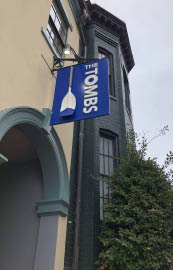ACTA is Founded!
1995

In a bar deep within Georgetown, The Tombs, a group of renowned public intellectuals created the National Alumni Forum. The founding members of what would be renamed the American Council of Trustees and Alumni included: former National Endowment for the Humanities chairman Lynne V. Cheney; former Colorado governor Richard Lamm; then U.S. Senator and future University of Colorado–Boulder president Hank Brown; sociologist David Riesman; Nobel Laureate Saul Bellow; former U.S. Senator Joe Lieberman; former philosophy professor at the University of Colorado–Boulder and first ACTA president Jerry L. Martin; and his successor Anne D. Neal.
Higher Ed Now, ACTA’s Podcast, is Launched
2015

Adding to an already extensive library of premier publications tailored to the needs of trustees, alumni, policymakers, students, and parents, ACTA moved into the digital world to engage directly with those who shape the higher education landscape. Higher Ed Now features leading experts in higher education such as Rick Hess, director of education policy studies at the American Enterprise Institute; Sean Decatur, president of Kenyon College; Samuel Abrams, professor of political science at Sarah Lawrence College; and many more.
Nevada’s Board of Regents Adopts ACTA’s 10 Questions
2015

ACTA’s Getting the Data: 10 Questions Trustees Should Ask was implemented by the Nevada System of Higher Education’s Board of Regents as a basis for its dashboard metrics and the presidents of all eight public colleges and universities in the state were tasked with providing the board answers to the ten questions. The key to effective governance is knowledge and data. ACTA is glad to provide the resources and best practices that trustees need to conduct their fiduciary duties!
WHO WE ARE
Launched in 1995, we are the only organization that works with alumni, donors, trustees, and education leaders across the United States to support liberal arts education, uphold high academic standards, safeguard the free exchange of ideas on campus, and ensure that the next generation receives an intellectually rich, high-quality college education at an affordable price.
Discover MoreSTAY INFORMED
Sign up to receive updates on the most pressing issues facing our college campuses.